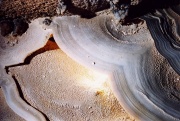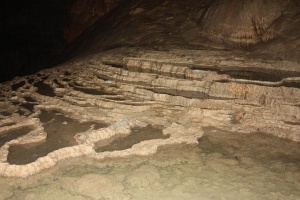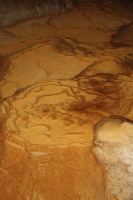Calcite (Inventory)/Rimstone Dam
From LagWiki
(Improve the description) |
(Another image) |
||
| Line 2: | Line 2: | ||
The '''Rimstone Dam''' field of the [[Calcite (Inventory)|Calcite]] section should be used to record any observation of rimstone dams. | The '''Rimstone Dam''' field of the [[Calcite (Inventory)|Calcite]] section should be used to record any observation of rimstone dams. | ||
| - | Rimstone dams are calcite deposits that form at the edges of water to make terraces or walls over which the water spills. Unlike [[Calcite (Inventory)/Shelfstone|shelfstone]], they are not flat and horizontal, but are sloped and | + | Rimstone dams are calcite deposits that form at the edges of water to make terraces or walls over which the water spills. Unlike [[Calcite (Inventory)/Shelfstone|shelfstone]], they are not flat and horizontal, but are sloped and have height. Each terrace is stair-stepped from its neighbor. They form at the edges of pools or along sloping water paths when the water spills and loses some of its CO<sub>2</sub>. |
| - | Rimstone dams can occur singularly or in large, cascading terraces of dams. The spaces behind each dam will usually be lined with [[Calcite (Inventory)/Spar/chenille/pool|pool spar]]. They can vary greatly in both height and width from small ripples to large walls. | + | Rimstone dams can occur singularly or in large, cascading terraces of dams. The spaces behind each dam will usually be lined with [[Calcite (Inventory)/Spar/chenille/pool|pool spar]]. They can vary greatly in both height and width from small ripples to large walls. Smaller rimstone dams are also known as gours. |
Look for them on the floor where water may have once flowed and take care during survey not to damage them as the walls can be very thin and fragile. | Look for them on the floor where water may have once flowed and take care during survey not to damage them as the walls can be very thin and fragile. | ||
| Line 10: | Line 10: | ||
<gallery caption=Gallery perrow=1 widths=300px heights=200px> | <gallery caption=Gallery perrow=1 widths=300px heights=200px> | ||
File:Rimstone Dams.jpg|A large group of rimstone dams | File:Rimstone Dams.jpg|A large group of rimstone dams | ||
| + | File:Gours.JPG|Gours or small rimstone dams | ||
</gallery> | </gallery> | ||
Revision as of 05:06, 16 July 2013
The Rimstone Dam field of the Calcite section should be used to record any observation of rimstone dams.
Rimstone dams are calcite deposits that form at the edges of water to make terraces or walls over which the water spills. Unlike shelfstone, they are not flat and horizontal, but are sloped and have height. Each terrace is stair-stepped from its neighbor. They form at the edges of pools or along sloping water paths when the water spills and loses some of its CO2.
Rimstone dams can occur singularly or in large, cascading terraces of dams. The spaces behind each dam will usually be lined with pool spar. They can vary greatly in both height and width from small ripples to large walls. Smaller rimstone dams are also known as gours.
Look for them on the floor where water may have once flowed and take care during survey not to damage them as the walls can be very thin and fragile.
See also
References
- Hill, Carol; Paolo Forti (1997) Cave Minerals of the World (Second Edition ed.) National Speleological Society pp 92-94 ISBN: 1-879961-07-5
- Palmer, Arthur N. (2007) Cave Geology CAVE BOOKS, Dayton, OH pp 277-278 ISBN-13: 978-0-939748-66-2, ISBN-10: 0-939748-66-5



